Research Program “Exploitation of Oncogenic Mechanisms” (EOM)
The primary goal of the program Exploitation of Oncogenic Mechanisms (EOM) is to gain a better understanding of the errors and combinations of errors within the complex cross-linked cellular and molecular mechanisms that can result in cancer. By using newest molecular biological, biochemical and bioinformatics technologies as well as in vivo models the scientists of the program investigate which genes and proteins are active and which are turned off during tumor development, and how these molecular differentiations influence the course of the disease and the course of the therapy.
Gained knowledge on oncogenic mechanisms, is exploited to define therapeutic targets, therapeutic strategies an biomarkers. The investigations are focused on questions about intracellular communication and regulation mechanisms, the role and regulation of cancer stem cells, communication of tumor cells with their environment (tumor microenvironment), and so-called epigenetic mechanisms of gene regulation.
The program focuses on evaluating mechanistic hypotheses of cancer biology, with the broader aim of obtaining preclinical evidence that it is promising to therapeutically target these mechanisms. By discovering novel mechanisms and by dissecting cellular and molecular pathways, including those responsible for therapy resistance, the program provides the basis for biology-driven diagnostic or therapeutic strategies, including druggable targets. It can thus be considered as the mechanistic arm uncovering the Achilles heels of cancer and cancer stem cells.
Furthermore, results of clinical studies within DKTK will be reverse-translated into molecular studies within the EOM Program with the aim of characterizing their functions.
Selected major translational highlights
Preclinical research:
1. The ground-breaking research by A. Trumpp (HD) shed light on hematopoietic and leukemic stem cells and their therapy resistance, dormancy and signaling (Raffel et al., Nature 2017; Cabezas-Wallscheid et al., Cell 2017; Bahr et al., Nature 2018) – also in collaboration with groups led by C. Lengerke (TÜ) and R. Zeiser (FR) (Paczulla et al., Nature 2019).
2. The development of advanced mouse models led to important discoveries for a better understanding of tumor microenvironment, with F. Greten (F/MZ) identifying mitophagy as a trigger for adaptive immunity during intestinal tumorigenesis (Ziegler et al., Cell 2018), and L. Zender (TÜ) uncovering the fact that a necroptosis microenvironment directs lineage commitment in liver cancer (Seehawer et al., Nature 2018).
3. J. Ruland and R. Rad (M) identified PD-1 as a haploinsufficient suppressor of T cell lymphomagenesis (Wartewig et al., Nature 2017). D. Saur and R. Rad (M) uncovered evolutionary routes of pancreatic cancer that direct KRAS gene dosage levels and cancer aggressiveness, as well as the context-specific genetic interactions that drive cancer development in distinct tissue types (Mueller et al., Nature 2018; Facomatà et al., Cancer Discov 2021).
4. C. Schmitt (B) was able to demonstrate the reversibility of senescence in cancer cells proving that senescence-associated reprogramming promotes cancer stemness (Milanovic et al., Nature 2018).
5. To deepen understanding of cancer genome for patient stratification, S. Diederichs (FR) systematically analyzed synonymous and nonstop mutations as novel mutation classes affecting cancer gene expression and function (Sharma et al., Nat Commun 2019; Dhamija et al., Nat Cell Biol 2020).
6. S. Knapp (F/MZ) was a corresponding author of the international study on bromodomains and epigenetic signaling, which developed a chemical probe set that can serve as a resource for future applications in the discovery of new physiological roles of bromodomain proteins in normal and disease states (Wu et al., Nat Commun 2019).
Clinical studies:
7. M. Lübbert (FR) was the Principal Investigator of the DKTK co-funded phase II study of decitabine alone or in combination with valproic acid and all-trans retinoic acid in acute myeloid leukemia (AML) (DECIDER, NCT00867672), using epigenetic combination therapies based on retinoic acid for elderly AML patients ineligible for induction chemotherapy (Lübbert et al., J Clin Oncol 2020). The study demonstrated that adding all-trans retinoic acid (ATRA) to decitabine results in a higher remission rate and a clinically meaningful survival extension in these patients with difficult- to-treat disease, without added toxicity.
Overall Program Coordinator

Prof. Dr. Sven Diederichs
Head of department – partner site Freiburg
Deputy Overall Program Coordinators

Prof. Dr. Björn Scheffler
DKFZ Division of Translational Oncology / Neurooncology

Prof. Dr. Dieter Saur
Clinic and Polyclinic for Internal Medicine II TUM University Hospital Rechts der Isar